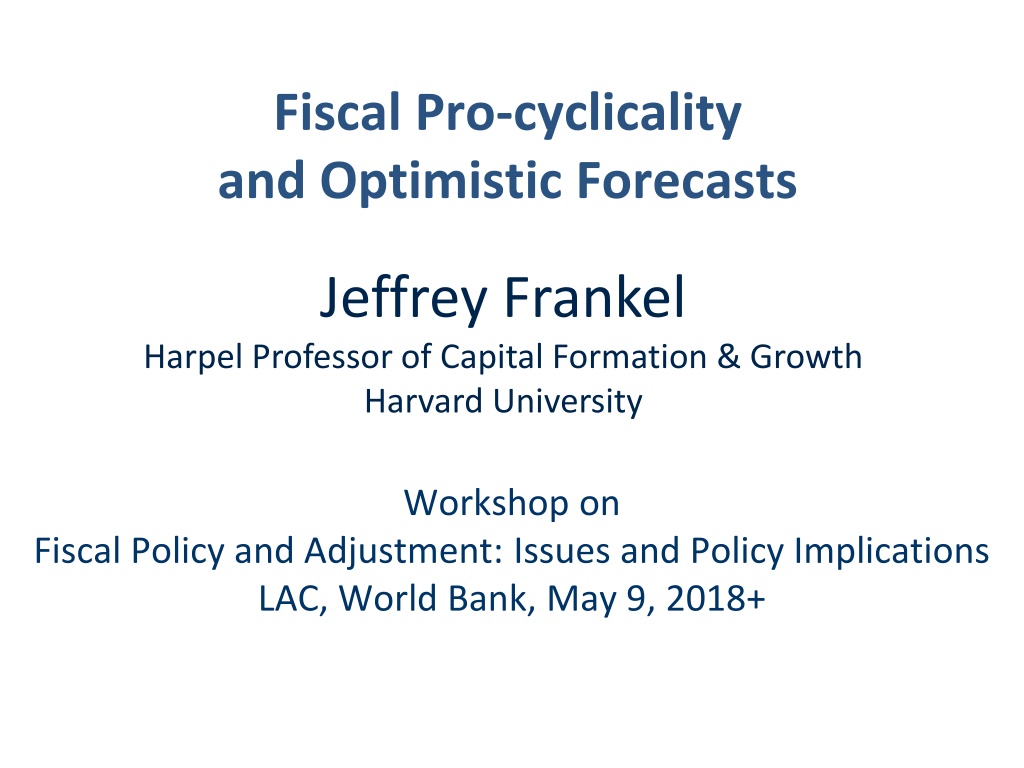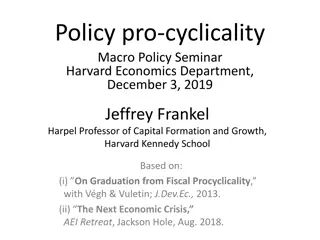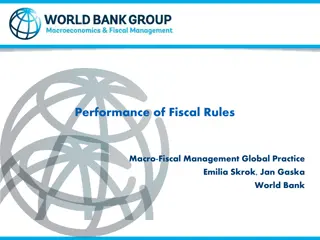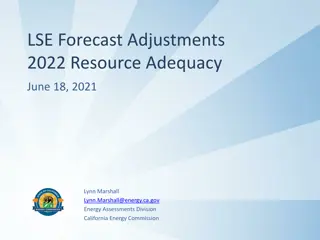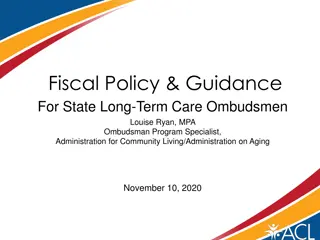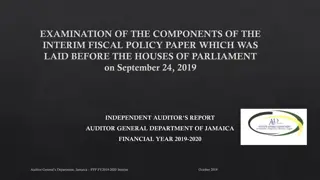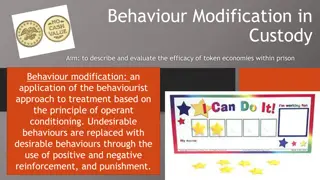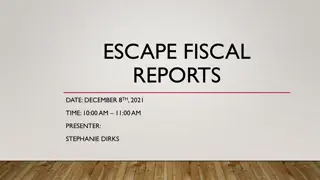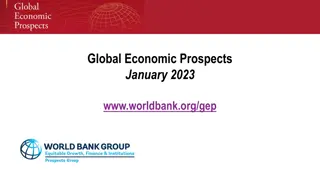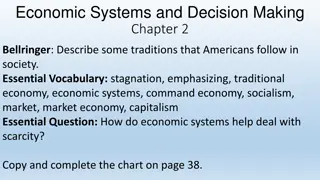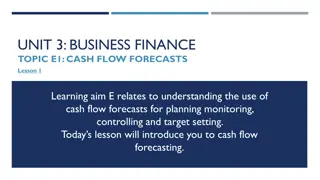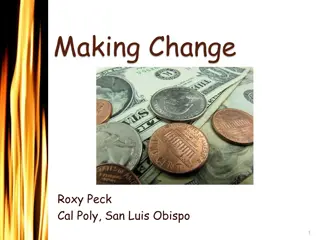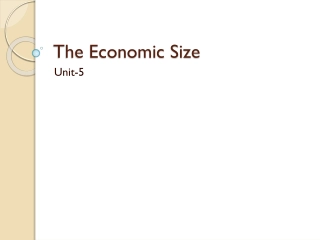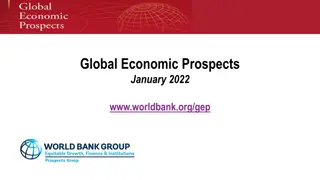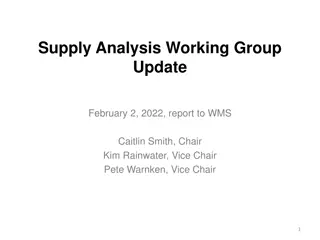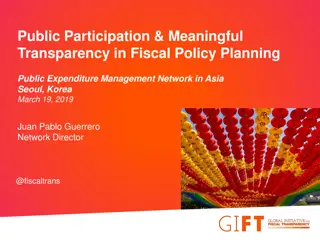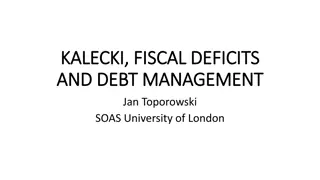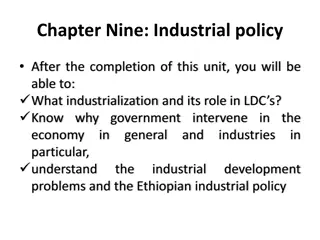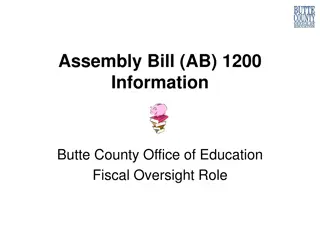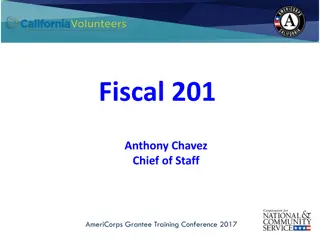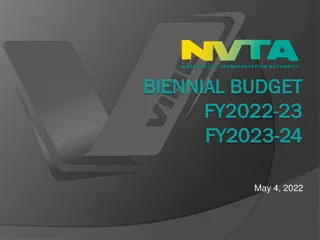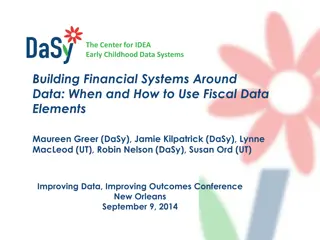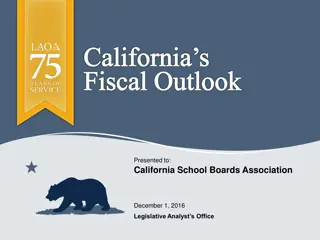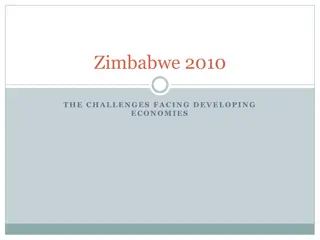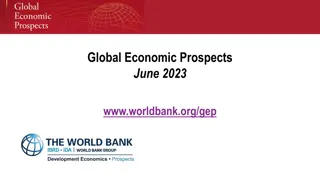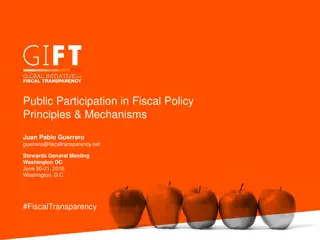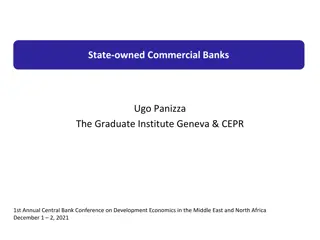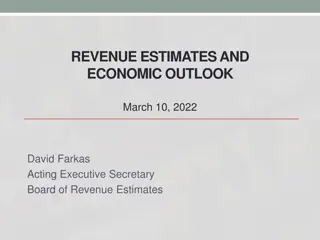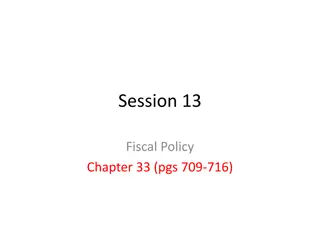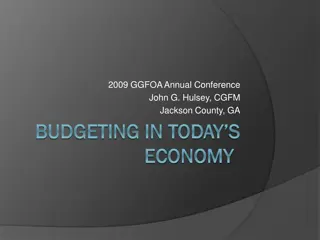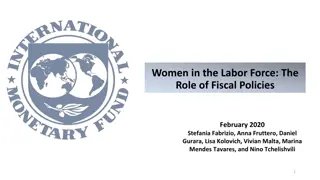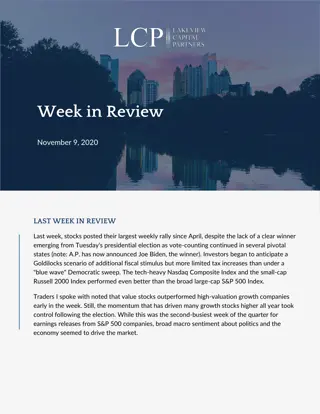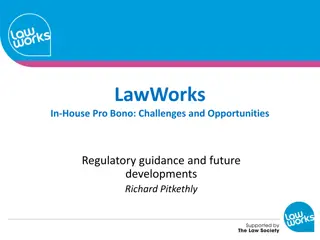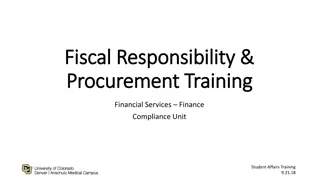Understanding Fiscal Pro-cyclicality and Optimistic Forecasts in Developing Economies
Fiscal policy in developing countries has historically shown pro-cyclical tendencies, exacerbating economic cycles. Leaders often fail to utilize periods of economic booms to strengthen budgets, leading to over-optimistic forecasts. However, some countries have managed to break this pattern by running budget surpluses during boom times, enabling them to navigate crises more effectively.
Download Presentation

Please find below an Image/Link to download the presentation.
The content on the website is provided AS IS for your information and personal use only. It may not be sold, licensed, or shared on other websites without obtaining consent from the author. Download presentation by click this link. If you encounter any issues during the download, it is possible that the publisher has removed the file from their server.
E N D
Presentation Transcript
Fiscal Pro-cyclicality and Optimistic Forecasts Jeffrey Frankel Harpel Professor of Capital Formation & Growth Harvard University Workshop on Fiscal Policy and Adjustment: Issues and Policy Implications LAC, World Bank, May 9, 2018+
Fiscal policy has two jobs (macroeconomically). Long run: keep enough budget discipline on average to ensure debt is sustainable. Medium run: keep fiscal policy counter-cyclical. Or, if counter-cyclical is too difficult, at least don t allow it to be pro-cyclical. 2
Pro-cyclicality Fiscal policy has historically tended to be pro-cyclical in most developing countries, thereby worsening ups & downs in the economic cycle. Correlation of income & spending mostly positive: Cuddington (1989), Gavin & Perotti (1997), Tornell & Lane (1999), Kaminsky, Reinhart & V gh (2004), Talvi & V gh (2005), Alesina, Mendoza & Oviedo (2006), Campante & Tabellini(2008), Ilzetski & V gh (2008), Medas & Zakharova (2009), Erbil (2011), C spedes & Velasco (2014), Bova, Carcenac & Guerguil (2014), Avellan & Vuletin (2015), V gh, Lederman & Bennett (2017). Tax policy tends to be pro-cyclical as well: V gh & Vuletin (2015). 3
Why do leaders fail to take advantage of boom times to strengthen the budget? People don t see the need to fix the hole in the roof when the sun is shining. They may see the mistake when the storm hits, but then it is too late. My claim: Official forecasts are over-optimistic in boom periods, rationalizing the failure to act according to data from 33 countries. 4
Correlations between Gov.t Spending & GDP 1960-1999 procyclical Grafico de Pe arol adapted from Kaminsky, Reinhart & V gh (2004) countercyclical G always used to be pro-cyclical for most developing countries. 5
The procyclicality of fiscal policy, cont. An important development -- some developing countries were able to break the historic pattern after 2000: taking advantage of the boom of 2002-2008 to run budget surpluses & build reserves, thereby earning the ability to expand fiscally in the 2008-09 crisis. chile-flag Chile, Costa Rica, Botswana, Malaysia, S. Korea Subsequently, some went back to full pro-cyclicality, e.g., Argentina, Brazil, & Ecuador. 6 6
Correlations between Government spending & GDP 2000-2009 Adapted from Frankel, V gh & Vuletin (JDE, 2013) In the decade 2000-2009, about 1/4 developing countries switched to countercyclical fiscal policy: Negative correlation of G & GDP. DEVELOPING: 43% (or 32 out of 75) countercyclical. Was 17% (or 13 out of 75) in 1960-99. ADVANCED: 86% (or 18 out of 21) countercyclical. Was 80% (or 16 out of 20) in 1960-99. Thanks to Guillermo Vuletin7
Update of Correlation (Govt spending, GDP): 2000-17 After 2010, back-sliding among some countries. Thanks to Luis Morano. Cyclical components of both real GDP and real Government Spending are calculated by Hodrick-Prescott filter, using 6.25 as smoothing parameter and extracting the cyclical components from the series of the level.8
Who achieves countercyclical fiscal policy? Countries with good institutions 1960-2009 Corr(G,GDP) IQ Corr(G,GDP) = 0.81 1.02 (averageIQ) (.09)*** (.15)*** Frankel, V gh & Vuletin; JDE, 2013. On Graduation from Fiscal Procyclicality. Average Institutional Quality 9
The quality of institutions varies, not just across countries, but also across time. 1984-2009 Improved institutions; Less-cyclical spending. Worsened institutions; More-cyclical spending. IQ IQ Good institutions; Countercyclical spending Corr Corr Corr IQ Frankel, V gh & Vuletin, 2013. 10
Advanced countries can suffer pro-cyclicality too. i) The euro periphery. ii) The US. 11
(i) Pro-cyclical fiscal policy in Europe: When the euro crisis hit in 2009, the bigger fiscal contractions went with the bigger recessions. 12 Source: P.Krugman, 10 May 2012.
Why? A different kind of over-optimism: Effects of austerity were worse than the Troika had assumed. The evidence: the bigger the fiscal contraction, the bigger the GDP loss relative to what had been officially forecast in 2010. Europe: Growth Forecast Errors vs. Fiscal Consolidation Forecasts Blanchard & Leigh, 2014, Growth Forecast Errors and Fiscal Multipliers, American Economic Review. Note: Figure plots forecast error for real GDP growth in 2010 & 2011 relative to forecasts made in the spring of 2010, on forecasts of fiscal consolidation for 2010 & 2011 made in spring of year 2010. 13
With austerity, debt/GDP ratios continued to rise sharply: Declining GDP outweighed progress on reduction of budget deficits (Fatas & Summers, 2018). 200 Public Debt (% GDP) 180 160 France Germany 140 120 Greece Ireland 100 80 Italy Portugal 60 40 Spain 20 0 . 14 From Remi Bourgeot, Fondation Robert Schuman. Data source: IMF WEO,.
(ii) US fiscal policy Departing from history, especially in peacetime, the budget deficit has been raised sharply though the economy is at full employment. BD u Source: Goldman Sachs Global Investment Research, May 12, 2018 Data: Dept. of Labor & OMB 15
In Dec. 2017, the government cut taxes sharply although the US economy was already operating at its potential. Ed Dolan, Feb. 8, 2018 16
American fiscal conservatives have behaved pro-cyclically before Conservative leaders Fiscal action: discipline or laxity? Cyclicality? Aug.1988 thru 1990 Sept. 1990 G HW Bush Promised Boom, so pro-cyclical Recession, so pro-cyclical Boom, so pro-cyclical Boom, so pro-cyclical. read my lips, no new taxes Agreed with Congress to raise taxes & cut spending Voted against Clinton s budget balance law (extension of GHWB s) More tax cuts and more spending. G HW Bush June 1993 Congressional Republicans G W Bush May 2003 Feb. 2009 Congressional Republicans Trump Voted against Obama fiscal stimulus Recession, so pro-cyclical Boom, so pro-cyclical Dec. 2017 Tax cut, followed by spending increase 17
Three kinds of over-optimism Belief Optimistic policy action Unintended consequence Commodity exporters Booms will continue into the future Can afford to run deficits during boom. Pro-cyclical fiscal policy. Euro-crisis Troika Expansionary austerity Spending cuts would not hurt GDP much. Tax cuts will boost GDP a lot: Budget deficit . Debt/GDP . American fiscal conservatives Supply side economics Budget deficit . 18
How can countries avoid pro-cyclical fiscal policy? What are good institutions, exactly? Rules? Budget deficit ceilings (SGP) or debt brakes? Have been tried by many countries: > 97 IMF members. Usually fail. Rules for cyclically adjusted budgets? Countries can more likely stick with them. But Rules don t address a major problem: Over-optimism in official forecasts of GDP growth rates, tax receipts & budgets. 19
Countries with Balanced Budget Rules frequently violate them. BBR: Balanced Budget Rules DR: Debt Rules ER:Expenditure Rules Compliance < 50% International Monetary Fund, 2014 20
Over-optimism in official forecasts Statistically significant findings among 33 countries Frankel (2011, 2012). Official forecasts on average are overly optimistic, for: (1) GDP & (2) budgets. The bias toward optimism is: (3) stronger the longer the forecast horizon; (4) greater in booms. 21
Implication of forecast bias for actual budgets Over-optimistic in growth forecasts leads to over-optimism in tax revenue and so to over-optimism in budget forecasts. Can lead to pro-cyclical fiscal policy: If the boom is forecast to last indefinitely, there is no apparent need to retrench. 22
Mistakes in GDP forecasts tend to cause mistakes in tax revenue forecasts LAC country forecasts for 2016 Andrew Powell, IDB, Nov. 2017 LACEA, Buenos Aires. Fiscal Challenges in Latin America and the Caribbean. 23
The optimism bias is significantly greater in booms and at longer horizons. Budget balance forecast error as % of GDP Variables GDP gap 1 year ahead 0.093*** (0.019) 0.201 (0.197) 398 0.033 2.25 2 years ahead 0.258*** (0.040) 0.649*** (0.231) 300 0.113 2.73 3 years ahead 0.289*** (0.063) 1.364*** (0.348) 179 0.092 3.10 Constant Observations R2 RMSE *** p<0.01 (Robust standard errors in parentheses, clustered by country.) GDP gap is lagged: it lines up with the year in which forecast was made, not the year being forecast. Frankel (2011) 24
What institutions might help address the problem of bias in fiscal forecasts? BD rules don t help. Europe s SGP worsens forecast bias for euro members. Frankel & Schreger (2013) Evidence suggesting possible solutions: (1) Private sector forecasts can help. chile-flag (2) The case of Chile s fiscal institutions. 25
(1) Private forecasts can help Frankel & Schreger (2016) When official forecasts of GDP are more optimistic than private forecasts, on average they are too optimistic. 26
When official forecasts of budget balance are more optimistic than private forecasts, on average they are too optimistic. Frankel & Schreger (2016) 27
Frankel & Schreger (2016) conclusions regarding private forecasts: Incorporating private sector forecasts into the budget process could help countries stick to fiscal rules. 1. Official forecasters are more over-optimistic than private forecasters judged by average outcomes for budget balances & real GDP. 2. While euro area governments would never forecast violations of the 3% deficit/GDP cap in the SGP during the period 1999-2009, private sector forecasters would. 3. Official forecasts could do better over time by putting some weight on private forecasts. 28
chile-flag (2) The case of Chile Chile s fiscal institutions appear to have overcome the problem of over-optimism - Frankel (2013) In 2000 Chile instituted its structural budget rule. The institution was formalized in law in 2006. The structural budget surplus must be targeted, at 0 as of 2008, where structural is defined by output & copper price equal to their long-run trend values. I.e., in a boom the government can only spend increased revenues that are deemed permanent; any temporary copper bonanzas must be saved. 29
chile-flag Chilean fiscal institutions, continued Chile did not show bias toward optimism in forecasts of the budget, growth or copper price. The key innovation that allowed Chile to achieve countercyclical fiscal policy: not just a structural budget rule in itself, but rather a regime that entrusts to two panels of independent experts estimation of the long-run trends of copper prices & GDP. 30
Unlike the rest of the panel of 33 countries, Chile s official forecasts were not over-optimistic. Forecasts of budget balance vs. actual 31
chile-flag The Pay-off Chile s fiscal position strengthened immediately: Public saving rose from 2.5 % of GDP in 2000 to 7.9 % in 2005 allowing national saving to rise from 21 % to 24 %. Government debt fell sharply as a share of GDP and the sovereign spread gradually declined. By 2006, Chile achieved a sovereign debt rating of A, several notches ahead of Latin American peers. By 2007, it had become a net creditor. By Dec. 2007, Chile s sovereign rating had climbed to A+, ahead of some advanced countries. => It was able to respond to the 2008-09 recession via fiscal expansion. 32
List of relevant references by the author Bias in Official Fiscal Forecasts: Can Private Forecasts Help? with Jesse Schreger, NBER Working Paper 22349, 2016. On Graduation from Fiscal Pro-cyclicality, with Carlos V gh & Guillermo Vuletin, Journal of Development Economics, 100, 1, 2013; pp. 32-47. A Solution to Fiscal Pro-cyclicality: The Structural Budget Institutions Pioneered by Chile, in Fiscal Policy and Macroeconomic Performance, Luis Felipe C spedes & Jordi Gal , eds. (Central Bank of Chile: Santiago), 2013, pp. 323-391. "Over-optimistic Official Forecasts and Fiscal Rules in the Eurozone," with J. Schreger; Review of World Economy, 2013. . "Over-optimism in Forecasts by Official Budget Agencies and Its Implications," Oxford Review of Economic Policy, 2011, 536-562. A Lesson From the South for Fiscal Policy in the US and Other Advanced Countries, Comparative Economic Studies, 2011, 407-430. Snake-Oil Tax Cuts, 2008,HKS RWP 08-056. 33
